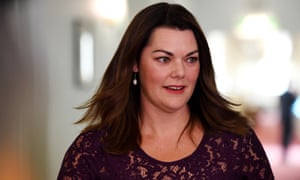Extract from The Guardian
Sarah Hanson-Young secures inquiry after the popularity of Kevin Rudd’s petition for a royal commission into News Corp.
The former prime ministers Kevin Rudd and Malcolm Turnbull will be called to give evidence at a Senate inquiry into media diversity that will examine the dominance of News Corp Australia and its impact on democracy.
The Greens senator Sarah Hanson-Young won support for the inquiry on Wednesday following the popularity of Rudd’s petition for a royal commission into the Murdoch media.
Hanson-Young told Guardian Australia it was essential the two former leaders, who have been outspoken about the role of the Murdoch press, be allowed to “speak frankly and have the protection of parliamentary privilege, which is important when you’re talking about issues of power and influence”.
News Corp Australia’s editors and commercial executives, alongside independent and regional and rural editors, would also be called to give evidence, she said.
News Corp Australia’s executive chairman, Michael Miller, said on Wednesday the company had been a participant in at least nine media inquiries held over the past decade. “As always, we will continue to constructively engage in these important conversations,” he said in a statement.
The environment and communications references committee will call for submissions immediately and is due to report by the end of November 2021. The government did not oppose the motion in the Senate so it passed without a vote.
“As a parliament, it was right that we acted on those concerns. The media landscape in Australia has been changing rapidly. We need to ensure we have a strong and independent public interest news industry to support our democracy.”
Hanson-Young said media voices were being lost across the country and access to news and public interest journalism was vanishing altogether in some regions. The increased pressure faced by small and independent publishers was bad for democracy, the Greens senator said.
“The dominance of Facebook and Google has been ever-increasing and this inquiry will also provide an opportunity for a proper consideration of how that is impacting media diversity.”
Rudd’s petition, which got more than half a million signatures, has sparked a conversation about the role of the Murdoch press in Australia and its contribution to climate denialism in particular.
“Murdoch has become a cancer – an arrogant cancer on our democracy,” Rudd, the 26th prime minister, said when he launched the petition last month.
“Someone like yourself, David, you should have the opportunity to tell the truth about what it was like working in Sky News,” Turnbull said to Speers who hosts ABC’s Insiders on Sunday. “Because you were there in the belly of the beast. You couldn’t bear it any longer and you left.”
On Q+A on Monday, Turnbull asked Kelly: “How offensive, how biased, how destructive does it have to be, Paul, before you will say – one of our greatest writers and journalists – ‘It’s enough, I’m out of it’?”
Headquartered in New York, News Corp Australia says 16 million Australians “choose to consume news and information across News Corp Australia’s suite of multi-platform products – more than any media group in Australia”.
The Labor communications spokeswoman, Michelle Rowland, said the government should not use the inquiry as an excuse to “sit on its hands”.
“Labor won’t stand in the way of Australians concerned about the media having a chance to be heard,” she said. “Australia’s media is in crisis and there is already a range of reports and recommendations designed to support the media sitting in minister Paul Fletcher’s too-hard basket.”
Labor did not back Rudd’s call for a royal commission but the petition was presented to the parliament on Monday by the Labor MP Andrew Leigh.
The terms of reference for the Senate inquiry do not mention News Corp Australia or Rupert Murdoch but call for an examination of the “state of media diversity, independence and reliability in Australia and the impact that this has on public interest journalism and democracy”.
It will examine the state of public interest journalism, the impact of Australia’s media ownership laws on media concentration and the viability of media business models.
Earlier this week, the company said Turnbull’s claim that its newspapers blamed arson for the bushfires was “blatantly untrue”. “The facts demonstrate starkly the falsity of Mr Turnbull’s claim,” a News Corp Australia spokesman said, noting its main papers had written 3,335 stories about the bushfires between September and January and only 3.4% mentioned arson.

No comments:
Post a Comment